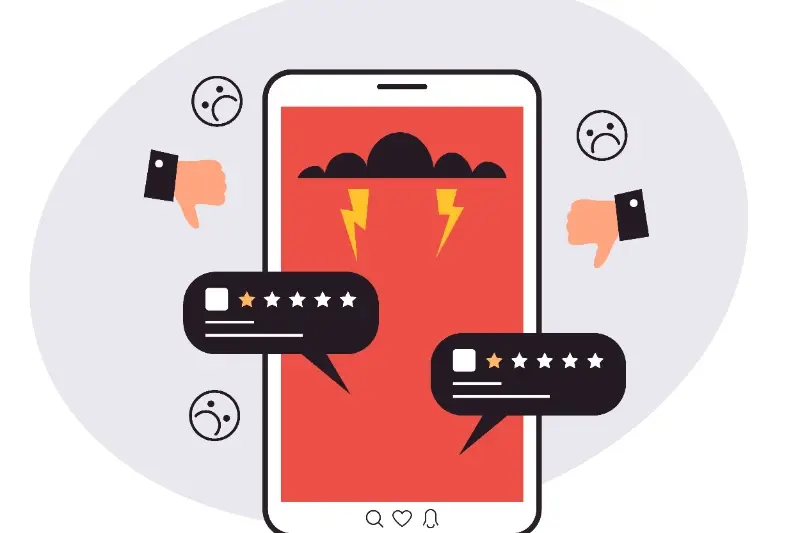Why Fake Reviews Backfire and What To Do Instead
Have you ever been tempted to buy fake reviews for your app? I won't judge you if the thought has crossed your mind—we've all been there. The app stores are packed with millions of apps, and standing out feels impossible sometimes. When you see competitors with hundreds of glowing five-star reviews while your genuinely great app sits with just a handful, it's natural to wonder if there's a shortcut.
The thing is, fake reviews might seem like a quick fix, but they're actually one of the worst mistakes you can make. I've watched countless app developers learn this the hard way over the years. What starts as a seemingly harmless boost to your ratings quickly spirals into a mess that can destroy your app's reputation, get you banned from app stores, and waste thousands of pounds you could have spent on proper marketing.
The temptation to take shortcuts in app marketing is understandable, but authentic growth always wins in the long run
App stores have become incredibly sophisticated at spotting dishonest reviews, and users? They're even better at it. We're talking about people who've downloaded hundreds of apps and read thousands of reviews—they can spot fake ones from a mile away. The good news is there are proven ways to build genuine reviews that actually help your app succeed. You just need to know what works and what doesn't. That's exactly what we're going to explore together.
The Hidden Costs of Fake Reviews
When you're launching a new app, the temptation to buy fake reviews can be overwhelming. I get it—everyone else seems to have hundreds of five-star reviews whilst you're sitting there with zero downloads. But fake reviews come with costs that go far beyond the money you pay for them.
The most obvious cost is getting caught. App stores are incredibly good at spotting fake reviews these days, and when they catch you, the penalties are severe. Your app can be removed from the store entirely, your developer account suspended, and all your hard work disappears overnight. That's not just embarrassing; it's financially devastating.
The Trust Problem
Users aren't stupid—they can spot fake reviews from a mile away. When potential customers see obviously fake reviews, they don't just ignore them; they actively avoid your app. You've actually made your situation worse than having no reviews at all. People would rather download an app with three genuine reviews than one with fifty fake ones.
Long-term Reputation Damage
The internet has a long memory. Once your app gets flagged for fake reviews, that reputation follows you around. Future apps from your company will be scrutinised more closely, making it harder to build trust with both users and app stores. You're essentially poisoning your own well.
Then there's the opportunity cost. The time and money you spend on fake reviews could be invested in making your app better, improving your marketing, or building genuine relationships with users. Those investments pay dividends; fake reviews just create problems you'll spend years trying to solve.
How App Stores Detect Dishonest Reviews
App stores have become incredibly sophisticated at spotting fake reviews—and they're getting better at it every day. Google Play and the App Store use complex algorithms that analyse patterns in user behaviour, review timing, and account history to identify suspicious activity. They can spot when multiple reviews come from the same IP address, when accounts are created just to leave reviews, or when there's an unusual spike in positive feedback within a short timeframe.
Reviews posted within hours of each other using similar language patterns are red flags that automated systems pick up immediately.
The detection systems look at far more than just the content of reviews. They examine the reviewer's account age, their history of app downloads, how long they've actually used the app, and whether their review patterns match real user behaviour. Brand new accounts that immediately start leaving glowing five-star reviews? That's a dead giveaway.
What Triggers the Detection Systems
Here are the main things that make app stores suspicious about your reviews:
- Multiple reviews from accounts created on the same day
- Reviews that use identical phrases or sentence structures
- Sudden bursts of positive reviews after periods of low activity
- Reviews from users who haven't actually downloaded the app
- Accounts that only review apps from the same developer
- Reviews posted from the same geographical location within minutes
Machine learning makes these systems smarter over time. They learn from patterns of confirmed fake reviews to identify new suspicious behaviour. The consequences aren't just having fake reviews removed—your entire app can be suspended or banned from the store completely. Trust me, I've seen developers lose everything because they thought they could game the system.
Why Users Spot Fake Reviews Instantly
People aren't stupid. That's the first thing developers need to understand when they're tempted to boost their app's rating with fake reviews. Users have been reading online reviews for years now—they know what genuine feedback looks like and what doesn't.
The telltale signs are pretty obvious once you know what to look for. Fake reviews often share similar language patterns, post dates clustered together, and usernames that look computer-generated. Real users write about specific features they love or hate; fake reviewers tend to use generic praise like "great app" or "works perfectly". Authentic reviews mention bugs, suggest improvements, or compare the app to competitors. Fake ones rarely go into that level of detail.
Red Flags That Give Fake Reviews Away
- Multiple five-star reviews posted on the same day
- Reviews that don't mention specific app features
- Perfect grammar and spelling in every review
- Usernames like "AppUser123" or random letter combinations
- Reviews that sound like marketing copy
- No negative reviews mixed in with the positive ones
Users also pay attention to review patterns. When an app suddenly jumps from 2.5 stars to 4.8 stars overnight, that raises eyebrows. Real growth in ratings happens gradually as more people discover and use your app.
The most savvy users even check reviewer profiles to see if they've left similar generic reviews for other apps. Social proof only works when it's actually social—and genuine. When users spot fake reviews, they don't just ignore them; they lose trust in your entire app and brand.
Building a Genuine Review Strategy
Right, so we've established that fake reviews are a terrible idea—they cost money, get spotted by app stores, and users can see right through them. Now what? The good news is that building a genuine review strategy isn't rocket science, but it does require some planning and patience.
The foundation of any solid review strategy starts with making an app that people actually want to use. Sounds obvious, doesn't it? Yet so many developers skip this step and wonder why their review count stays stubbornly low. Your app needs to solve a real problem or provide genuine value before anyone will bother leaving a review.
Timing Your Review Requests
When you ask for reviews matters just as much as how you ask. Don't bombard users the moment they open your app—that's just annoying. Wait until they've had a positive experience; maybe they've completed their first successful task or reached a small milestone. That's when people are most likely to feel good about your app and want to share that experience.
The best time to ask for a review is right after someone has experienced the core value your app provides
Making Reviews Feel Natural
App store guidelines are quite clear about review ethics—you can ask for honest feedback, but you can't incentivise specific ratings or try to manipulate the system. The smart approach is to make leaving a review feel like a natural part of the user journey, not a desperate plea for stars. Focus on creating moments where users genuinely feel like sharing their experience, and the authentic reviews will follow.
Getting Reviews the Right Way
Right, so you've decided to build a proper review strategy—good choice! The question now is how do you actually get people to leave genuine reviews without resorting to dodgy tactics? Well, it's simpler than you might think, but it does require a bit of patience.
Ask at the Right Moment
Timing is everything when it comes to requesting reviews. You don't want to pester someone the moment they download your app—that's just annoying. Instead, wait until they've had a positive experience. Maybe they've just completed their first successful transaction, unlocked an achievement, or reached a milestone in your app. That's when people feel good about what they've just done and are more likely to share that feeling.
The request itself should be simple and non-intrusive. A gentle popup asking "Enjoying the app? We'd love a quick review!" works well. Give users the option to decline without making them feel guilty about it. Some people just don't leave reviews, and that's perfectly fine.
Make Leaving Reviews Easy
Don't make users jump through hoops to leave a review. Include a direct link to your app store page, or better yet, use the built-in review prompts that both iOS and Android provide. These let users rate your app without leaving it—much more convenient.
You can also encourage reviews through your other channels. Send a friendly email to your most engaged users, mention it in your app's onboarding process, or add a gentle reminder in your app's settings menu. The key word here is gentle—nobody likes being bombarded with review requests.
Remember, good apps naturally generate good reviews over time. Focus on making your app brilliant first, then the reviews will follow.
Responding to Negative Feedback
Here's where things get interesting—and where many app developers completely lose their nerve. You've built something you're proud of, launched it into the world, and then someone leaves a scathing one-star review that makes your heart sink. The temptation to ignore it, delete it, or worse, fight back with a defensive response is massive.
But negative feedback isn't your enemy. It's actually one of the most valuable things you can get for your app. When someone takes the time to explain what went wrong, they're giving you free product research. They're showing you exactly where your app falls short and what needs fixing.
Always respond to negative reviews within 24-48 hours—quick responses show you care about user experience and take feedback seriously.
The Right Way to Handle Critical Reviews
Your response needs to be professional, helpful, and focused on solving problems rather than defending your ego. Start by thanking the reviewer for their feedback; acknowledge their frustration, and explain what you're doing to fix the issue. Don't make excuses or blame the user for not understanding your app.
- Keep responses short and solution-focused
- Never argue or get defensive
- Take the conversation private when possible
- Follow up once you've fixed the reported issue
- Use feedback to improve your app's next update
Turning Critics into Advocates
The most powerful thing about handling negative feedback well? It often converts your biggest critics into your strongest supporters. When you fix someone's problem and show genuine care for their experience, they frequently update their review—sometimes even becoming vocal advocates for your app. That transformation from frustrated user to happy customer is worth more than any fake five-star review you could ever buy.
Conclusion
I've seen countless apps rise and fall over the years, and one pattern that never fails to disappoint me is when brilliant developers think they can shortcut their way to success with fake reviews. It just doesn't work—not now, not ever. The app stores are getting smarter, users are getting more savvy, and your reputation is far too valuable to risk on something so short-sighted.
The truth is, building genuine reviews takes time and effort, but that's exactly what makes them so powerful. When someone takes a moment out of their busy day to write about your app, that means something. Those reviews carry weight because they come from real experiences with real people who chose to download, use, and recommend your creation to others.
Getting there isn't always easy—you'll need to ask at the right moments, respond thoughtfully to feedback (yes, even the negative stuff), and most importantly, build an app that people actually want to talk about. But when you do it properly, those genuine reviews become one of your strongest assets. They build trust, improve your rankings naturally, and create a foundation that won't crumble the moment an algorithm changes.
The mobile app space is competitive enough without shooting yourself in the foot with fake reviews. Focus on creating something worth reviewing, make it simple for happy users to share their thoughts, and be patient with the process. Your future self will thank you for taking the long road—and so will your users.
Share this
Subscribe To Our Blog
You May Also Like
These Related Stories

Turning Negative App Reviews Into Growth Opportunities

App Review Response Strategies That Build User Trust





